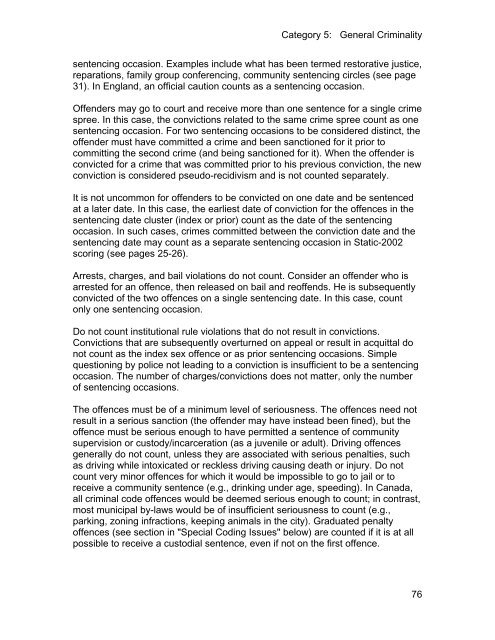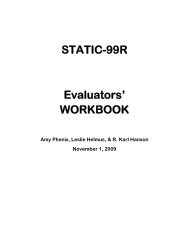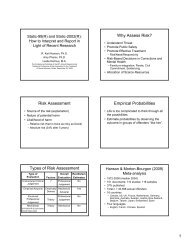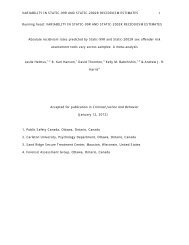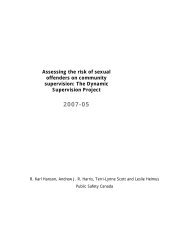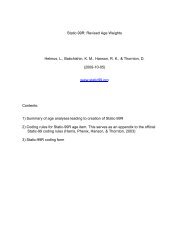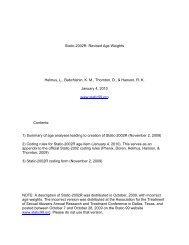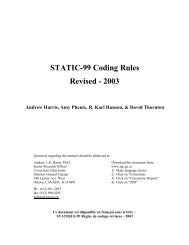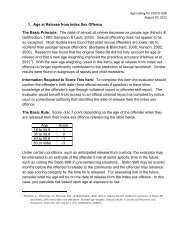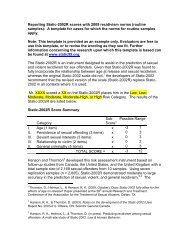Static-2002 coding rules (2009) - Static-99
Static-2002 coding rules (2009) - Static-99
Static-2002 coding rules (2009) - Static-99
Create successful ePaper yourself
Turn your PDF publications into a flip-book with our unique Google optimized e-Paper software.
Category 5: General Criminality<br />
sentencing occasion. Examples include what has been termed restorative justice,<br />
reparations, family group conferencing, community sentencing circles (see page<br />
31). In England, an official caution counts as a sentencing occasion.<br />
Offenders may go to court and receive more than one sentence for a single crime<br />
spree. In this case, the convictions related to the same crime spree count as one<br />
sentencing occasion. For two sentencing occasions to be considered distinct, the<br />
offender must have committed a crime and been sanctioned for it prior to<br />
committing the second crime (and being sanctioned for it). When the offender is<br />
convicted for a crime that was committed prior to his previous conviction, the new<br />
conviction is considered pseudo-recidivism and is not counted separately.<br />
It is not uncommon for offenders to be convicted on one date and be sentenced<br />
at a later date. In this case, the earliest date of conviction for the offences in the<br />
sentencing date cluster (index or prior) count as the date of the sentencing<br />
occasion. In such cases, crimes committed between the conviction date and the<br />
sentencing date may count as a separate sentencing occasion in <strong>Static</strong>-<strong>2002</strong><br />
scoring (see pages 25-26).<br />
Arrests, charges, and bail violations do not count. Consider an offender who is<br />
arrested for an offence, then released on bail and reoffends. He is subsequently<br />
convicted of the two offences on a single sentencing date. In this case, count<br />
only one sentencing occasion.<br />
Do not count institutional rule violations that do not result in convictions.<br />
Convictions that are subsequently overturned on appeal or result in acquittal do<br />
not count as the index sex offence or as prior sentencing occasions. Simple<br />
questioning by police not leading to a conviction is insufficient to be a sentencing<br />
occasion. The number of charges/convictions does not matter, only the number<br />
of sentencing occasions.<br />
The offences must be of a minimum level of seriousness. The offences need not<br />
result in a serious sanction (the offender may have instead been fined), but the<br />
offence must be serious enough to have permitted a sentence of community<br />
supervision or custody/incarceration (as a juvenile or adult). Driving offences<br />
generally do not count, unless they are associated with serious penalties, such<br />
as driving while intoxicated or reckless driving causing death or injury. Do not<br />
count very minor offences for which it would be impossible to go to jail or to<br />
receive a community sentence (e.g., drinking under age, speeding). In Canada,<br />
all criminal code offences would be deemed serious enough to count; in contrast,<br />
most municipal by-laws would be of insufficient seriousness to count (e.g.,<br />
parking, zoning infractions, keeping animals in the city). Graduated penalty<br />
offences (see section in "Special Coding Issues" below) are counted if it is at all<br />
possible to receive a custodial sentence, even if not on the first offence.<br />
76


